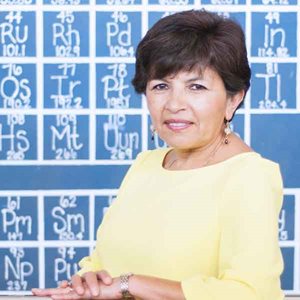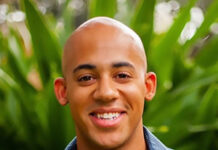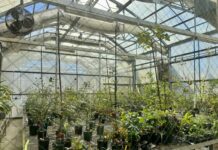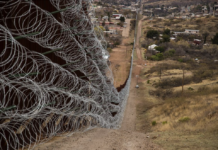
By Mani Thangaduarai
In February 2016, chemistry professor Dr. Carmen Valdez Gauthier was awarded the coveted and prestigious Fulbright Scholarship Award.
The award, which was created in 1946, is sponsored by the U.S. Department of State’s Bureau of Educational and Cultural Affairs and is awarded to 8,000 American Academicians each year.
As the Jessie Ball DuPont Chair of the Department of Chemistry and Physics, Dr. Gauthier is spending this semester in Peru teaching and conducting research at the Pontifical Catholic University of Peru in Lima. It was there that Gauthier earned her Bachelor’s Degree in Chemistry, and she has nothing but praise for the thorough education she received.
Born in 1960, Gauthier grew up in Peru during Communist rule. She remembers her family being personally affected. However, it didn’t stop her from attending some outstanding schools. She graduated from high school at the relatively tender age of 15.
“Under Communist rule, our land was taken away and given to the Government,” Gauthier said. “My father was then obliged to work even harder to support his family. He was an engineer and an entomologist who had the resources to work, and he always encouraged us to read and research ‘within boundaries.’ In Peru, the best schools at the time were Catholic Schools, and, along with French and German, English was taught in private schools. But during the Revolution, we had to learn our native language, Quechua.”
Everyone in Peru now speaks Spanish because education is mandatory. In the Andean region, there is a class in the native language. Children in Peru also learn English.
“It was a tumultuous time in Peru, and my then fiancée Dr. Tom Gauthier had come to visit my family,” Gauthier said. “Like other people, he was affected by the curfew.”
“Growing up in the U.S. meant that it would never happen to my children and I am glad I moved there.”
This semester Gauthier is living in a different part of Peru.
“I currently live in a safe place in Lima, three blocks from the President of Peru” Gauthier said. “It’s quite expensive, but I live in a small apartment. My neighborhood is very safe and my relatives live nearby. It’s also not too far from the Catholic University. I take public transport to commute to the University, and if I work late I have a driver. I’ve enjoyed reconnecting with some of my old classmates and professors.”
Ironically, Gauthier’s main passion was archaeology. However, she knew that in order to truly understand archaeology, specifically the age of the object and its composition, hard sciences can answer those questions.
“There is a lot of collaboration between different scientists in both fields,” Gauthier said. “In fact, I had spoken with one chemist working with an archaeologist on sites in Peru. The University also has a good program in archaeology. This year is also the 50th anniversary of establishment of the University’s chemistry program. The Carbon-14 method is a prime example of how Chemistry can be applied in archaeology, in this case to find out the age of a relic.”
Following her Bachelor’s education in Peru, Gauthier was able to study for a Ph.D. without attending Graduate school.
“It’s not uncommon in Chemistry to do a Ph. D. after completing a B.S. Degree,” Gauthier said. “I wanted to go to the US to do a Ph.D., and I found that the education I had received in Peru was very challenging. I had to study at an undergraduate level for 5 years with a lot of courses in chemistry, 3 years of general studies, 2 years of discipline and one year of research. I learned how to do research, especially in Spanish. The Vice-Principal of Academic Affairs at the University of New Hampshire picked me up at the airport and reassured me that most students don’t pass all their entrance exams at the first attempt. I took the exams two days after arriving and was able to pass all of them. I was then allowed to choose whatever course and classes I wanted, and I opted for the Ph.D. program.”
As a child, Gauthier had an ambition to be a Fulbright Scholar.
“Five years ago, I was Chair of the International Activities Committees which was a part of division of chemical education at the American Chemical Society,” Gauthier said. “As chair, you have to think of what you want to do. I wanted to highlight the scholar who received an International Travel Award. At a symposium on Global Collaborations in Chemical Education, an academician who spent a semester in Argentina talked about the Fulbright scholarship. I was advised to apply because I wanted to be an ambassador for Peru and Chemistry. Brazil and Colombia had Distinguished Chair positions, but I wanted to return to Peru and my Alma Mater. It wasn’t going to be easy to live here, but I wanted family and moral support.”
Gauthier was apprehensive about teaching at FSC, but started to love it after joining the college and meeting her students, and she loved the small school atmosphere.
“I am still in touch with one of my first students who lives in Georgia with her two children,” Gauthier said. “I could have been in a larger research university, but I would have been chasing the money at the same time. FSC allows me to continue researching, work with my students and be their mentors.”
Gauthier took time to discuss their significance and possible applications of conducting research in metal-organic materials.
“These are very simple materials whose properties can be controlled,” Gauthier said. “You choose an accessible metal and a linkable organic material. It’s almost like working with LEGO bricks. These are non-harmful materials which can have many applications in different fields, including the potential restoration of archaeological sites and development of water-resistant building materials. At the moment I am concentrating on bio-polymers, but I would love to see where research in this field will go.”
Gauthier also spoke with pride about her involvement in the FSC Chapter of the American Chemical Society.
“When I joined FSC in 1999, there was no active chapter,” Gauthier said. “For the first five years we worked hard to establish ourselves and set our policies. We partnered with elementary schools in Bartow and Mulberry, in addition to high schools in Lakeland and elsewhere in Polk County. We have received numerous awards for being an Outstanding Chapter or a Commendable Chapter and I have been to ACS National Meetings all over the country with 5-6 students. Credit goes to our President Dr. Anne Kerr for her support. Being an advisor for the Chapter gave me an opportunity to be involved with the students. I was involved until 2012, at which time I decided that younger faculty with new ideas should take a greater initiative.”
Gauthier also currently works from Thursday to Sunday with Universities in Lima to conduct science events in poor areas.
“This year the National Science Organization chose to host an event in a poor locality in the north of Lima,” Gauthier said. “It was wonderful to see the kids getting involved.”
As a Fulbright scholar for life, Gauthier wants to talk about multiple opportunities for students to study, get a degree, travel and gain a global experience. Gauthier is also interested in continuing collaboration with the Catholic University, particularly an opportunity to bring some students from FSC to Lima for a Junior Journey or any research opportunity.
“Going to the U.S. enabled me to meet people from different backgrounds with different beliefs and ideologies. Maybe someday an FSC student will have the privilege of being a Fulbright Scholar,” Gauthier said.







